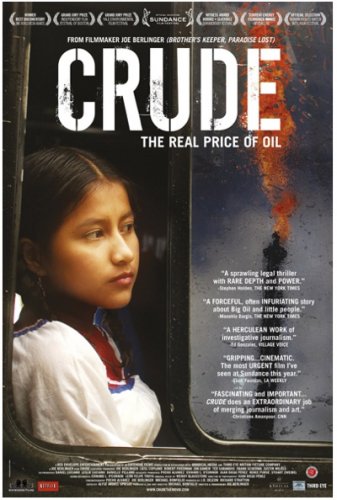 "Crude" director Joe Berlinger scored a modest victory in New York District Court on Thursday.
"Crude" director Joe Berlinger scored a modest victory in New York District Court on Thursday.
Judge Lewis Kaplan granted Berlinger a 10-day extension on the date he is required to surrender 600 hours of footage to Chevron.
Originally, Berlinger had been ordered to turn over the footage on Thursday. The extension will allow him to seek a hearing before a federal appeals court.
If he fails to turn over the footage by May 31, he risks being held in contempt.
However, while granting the extension, Kaplan denied the documentary maker’s request for a stay through the appeal process.
Further, Kaplan declared that the likelihood of success of an appeal appeared "quite modest."
Lawyers for Berlinger did not respond to a request for comment, but the director characterized the decision as a win of sorts.
""The temporary stay enables us to advance what we believe is a meritorious appeal on this very significant first amendment matter," Berlinger told TheWrap. "We still need the Second Circuit Court of Appeals to grant us a permanent stay in order to file a meaningful appeal, but we are grateful for today’s positive outcome."
That’s an interpretation that Chevron’s lawyers refuted.
"It’s a complete repudiation of every one of the arguments made by the filmmakers," Randy Mastro, a lawyer for Chevron. "It is a recognition of the compelling need and urgency for Chevron and the lawyers facing bogus criminal charges in Ecuador to obtain this evidence."
Chevron claims that the film in question could help them in a $27 billion damages case brought against them in Ecuador.
Indigenous tribes-people are charging Texaco, which Chevron acquired in 2001, with failing to clean up its oil fields along the Amazon River, resulting in environmental destruction and illness. Berlinger’s film documents the protracted legal fight, but Chevron’s lawyers claim that unused footage from the movie shows instances of misconduct by the plaintiff’s lawyers that undermine their case.
Kaplan wrote that Chevron’s legal team deserved an opportunity to review the footage quickly as two of the company’s lawyers face criminal charges in Ecuadorian court.
"The risk of imminent and perhaps irreparable harm to the petitioners if a stay were granted is palpable," Kaplan wrote. "The respondents’ claims of undue delay by petitioners are unpersuasive in view of the changes in the political and litigation situation in Ecuador."
Berlinger has argued that forcing him to turn over the outtakes to Chevron violates his First Amendment rights and could compromise his ability as a documentary filmmaker to protect his sources. In his decision on Wednesday, Kaplan rejected those claims.
"This Court certainly recognizes the utility of documentary films to public awareness of significant subjects and respects those who make such films," Kaplan wrote. "As a factual matter, however, it is not persuaded, given the evidence that Berlinger has adduced in this case, that disclosure of these Outtakes would impair the ability of Berlinger or other film makers to practice their craft and serve the public interest."


